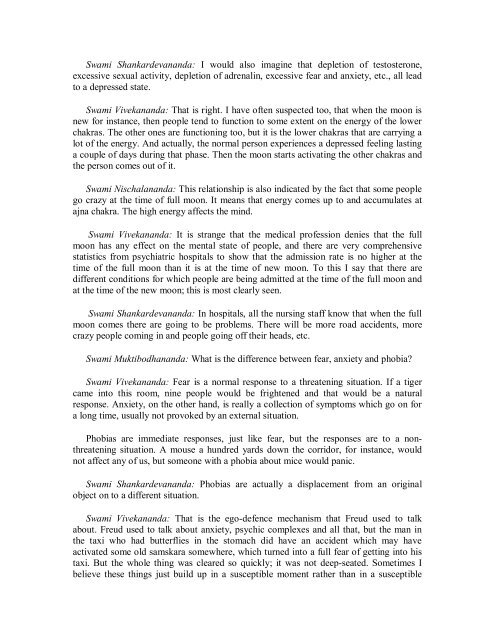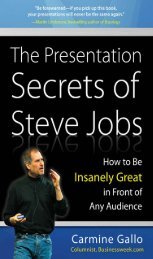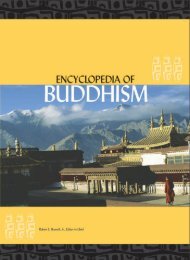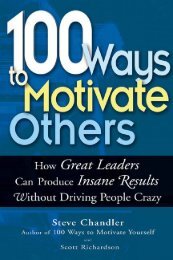- Page 1 and 2:
KUNDALINI TANTRA Swami Satyananda S
- Page 3 and 4:
6. Manipura Chakra 7. Anahata Chakr
- Page 5 and 6:
INTRODUCTION TO KUNDALINI TANTRA I
- Page 7 and 8:
A universal event The seat of kunda
- Page 9 and 10:
My father had great regard for the
- Page 11 and 12:
ody it is in the perineum, between
- Page 13 and 14:
Then there is the emergence of Durg
- Page 15 and 16:
It is very simple to understand. Wh
- Page 17 and 18:
A chakra is like a centrally placed
- Page 19 and 20:
(mental force) flow through every p
- Page 21 and 22:
positive pressure which starts the
- Page 23 and 24:
Why are these compartments inactive
- Page 25 and 26:
cerebrospinal fluid moves through t
- Page 27 and 28:
Awakening by birth By a favourable
- Page 29 and 30:
Why is it so great? It is due to a
- Page 31 and 32:
longer appealing, hunger and the se
- Page 33 and 34:
ordinary person, living a non-spiri
- Page 35 and 36:
cultivate a mental picture of him,
- Page 37 and 38:
If you minimize your interactions w
- Page 39 and 40:
Sometimes I used to feel like this.
- Page 41 and 42:
should be avoided and protein shoul
- Page 43 and 44:
wheat, add all the same ingredients
- Page 45 and 46:
Fear of mistakes Some people worry
- Page 47 and 48:
Siddhis and the ego factor When one
- Page 49 and 50:
A great misunderstanding Mystics th
- Page 51 and 52:
Chapter 10 Four Forms of Awakening
- Page 53 and 54:
one by one, and as a result of this
- Page 55 and 56:
When Shiva and Shakti descend to th
- Page 57 and 58:
The preliminary awakening of kundal
- Page 59 and 60:
Experiencing the threefold awakenin
- Page 61 and 62:
The process of transition There is
- Page 63 and 64:
one bad mind which keeps wandering
- Page 65 and 66:
visarga) towards the sun (manipura
- Page 67 and 68:
Therefore, the yogis have tried to
- Page 69 and 70:
Ejaculation brings down the tempera
- Page 71 and 72:
tantra, they switch roles. The woma
- Page 73 and 74:
Chakra perception The chakras, kund
- Page 75 and 76:
The granthis There are three granth
- Page 77 and 78:
Spontaneous and self-propelled evol
- Page 79 and 80:
the purpose of awakening the chakra
- Page 81 and 82:
When the mind is concentrated at th
- Page 83 and 84:
The pineal gland acts as a lock on
- Page 85 and 86:
When ajna is awakened, fickleness o
- Page 87 and 88:
In both the male and female bodies,
- Page 89 and 90:
awakening of kundaiini, but a relea
- Page 91 and 92:
manipura. Repeated earnest attempts
- Page 93 and 94:
Home of unconscious Swadhisthana is
- Page 95 and 96:
cycle of birth and rebirth is situa
- Page 97 and 98:
sublimate the form of their emotion
- Page 99 and 100:
The center of awakening According t
- Page 101 and 102:
Chapter 7 Anahata Chakra In kundali
- Page 103 and 104:
ound by your prarabdha karma. You k
- Page 105 and 106:
worst disease and medical science h
- Page 107 and 108:
So, in order to induce anahata awak
- Page 109 and 110:
Vishuddhi belongs to the fifth loka
- Page 111 and 112:
The potential of vishuddhi Vishuddh
- Page 113 and 114:
The actual isolation of such a mini
- Page 115 and 116:
the form, function or appearance of
- Page 117 and 118:
"When the red bindu (Shakti) moves
- Page 119 and 120:
Therefore, Patanjali classifies sam
- Page 121 and 122:
Illness If you suffer from any phys
- Page 123 and 124:
Padmasana is also utilized for cert
- Page 125 and 126:
Practice 3: Padmasana The lotus pos
- Page 127 and 128:
Chapter 3 Chakra Sadhana Course Mon
- Page 129 and 130:
Ajna and mooladhara chakras are clo
- Page 131 and 132:
Be aware of the physical body only.
- Page 133 and 134:
awareness of every vibration of the
- Page 135 and 136:
For men: Key to exact location of c
- Page 137 and 138:
perform jalandhara bandha, then moo
- Page 139 and 140:
Preparatory practices A large numbe
- Page 141 and 142:
Nauli kriya is the control of the r
- Page 143 and 144:
The abdominal lock Sit in a meditat
- Page 145 and 146:
They must both reach the navel at t
- Page 147 and 148:
The humming breath Sit in a comfort
- Page 149 and 150:
ajna - trataka and shambhavi mudra
- Page 151 and 152:
throat and not the nose. Try to mak
- Page 153 and 154:
Chapter 10 Practices for Bindu Visa
- Page 155 and 156:
Practice 3: Perception of subtle in
- Page 157 and 158:
depth of your being. Continue this
- Page 159 and 160:
this center. Count this pulsation 2
- Page 161 and 162:
Technique Sit in any comfortable me
- Page 163 and 164:
the spine in line with the navel. F
- Page 165 and 166:
important thing is to feel the proc
- Page 167 and 168:
Make sure you have all the necessar
- Page 169 and 170:
4: Practices for manipura chakra -
- Page 171 and 172:
practising the techniques given for
- Page 173 and 174:
8. manduki kriya 1-3 min. 1-3min. 9
- Page 175 and 176:
Kriya №1 Vipareeta Karani Mudra P
- Page 177 and 178:
Kriya №2 Chakra anusadhana Contin
- Page 179 and 180:
closed. Practise khechari mudra thr
- Page 181 and 182:
lower foot pressing firmly in towar
- Page 183 and 184:
This mudra can either be practised
- Page 185 and 186:
No. 8: Manduki kriya (the frog atti
- Page 187 and 188:
Sit in siddhasana, siddha yoni asan
- Page 189 and 190:
mooladhara. Bend your head forward.
- Page 191 and 192:
Sit in siddhasana, siddha yoni asan
- Page 193 and 194:
No. 17: Utthan (raising the kundali
- Page 195 and 196:
No.19: Linga sanchalana (astral con
- Page 197 and 198:
life, unmeasurable by even the most
- Page 199 and 200:
widely known and respected and more
- Page 201 and 202:
It is also generally accepted by sc
- Page 203 and 204:
therefore a living philosophy and n
- Page 205 and 206:
The third force Another force exist
- Page 207 and 208:
Yogis also tell us that when we pra
- Page 209 and 210:
We have always known that the right
- Page 211 and 212:
patients with right brain damage ar
- Page 213 and 214:
This powerful experience transforme
- Page 215 and 216:
Balanced breathing Even more conclu
- Page 217 and 218: Yoga also states that the chakras a
- Page 219 and 220: Motoyama has also worked out that b
- Page 221 and 222: 1. Motoyama, H., "Chakra, Nadi of Y
- Page 223 and 224: we can an external object or person
- Page 225 and 226: Figure 2 INNER SURFACE OF THE BRAIN
- Page 227 and 228: By practising yoga we learn to bala
- Page 229 and 230: limbic system than would normally o
- Page 231 and 232: individual subjects claimed to have
- Page 233 and 234: energy and back. Motoyama feels tha
- Page 235 and 236: There is nothing miraculous, abnorm
- Page 237 and 238: Recent developments in neurophysiol
- Page 239 and 240: most of our waking, dreaming or sle
- Page 241 and 242: 9. hand 10. little finger 11. ring
- Page 243 and 244: 5. a magnetic field of opposite pol
- Page 245 and 246: of the following: sitting, breath a
- Page 247 and 248: 1. Bentov, I., Stalking the Wild Pe
- Page 249 and 250: even when the glass is removed, con
- Page 251 and 252: ird hopping from place to place." (
- Page 253 and 254: intertwine and it is hard to separa
- Page 255 and 256: eat as quickly as possible. This im
- Page 257 and 258: Swami Vivekananda: Yes, I suppose m
- Page 259 and 260: Swami Vivekananda: This basic sexua
- Page 261 and 262: e an energy block or could that poo
- Page 263 and 264: Swami Vivekananda: I see ida and pi
- Page 265 and 266: Swami Vivekananda: Consider hystere
- Page 267: Swami Vivekananda: Exactly, tighten
- Page 271 and 272: Meditation- entering the heart spac
- Page 273 and 274: Amrit: psychic nectar which is secr
- Page 275 and 276: Chakra : literally 'wheel or vortex
- Page 277 and 278: Itarakhya lingam: symbol of Shiva i
- Page 279 and 280: Mudra: a psychic attitude often exp
- Page 281 and 282: Sahajoli: the form of vajroji mudra
- Page 283 and 284: Tanmatra: the sense activities - si














![[Lonely Planet] Sri Lanka](https://img.yumpu.com/59845622/1/169x260/lonely-planet-sri-lanka.jpg?quality=85)


